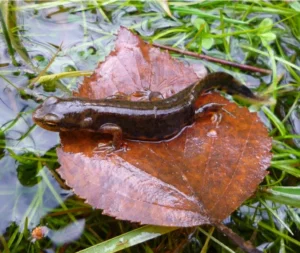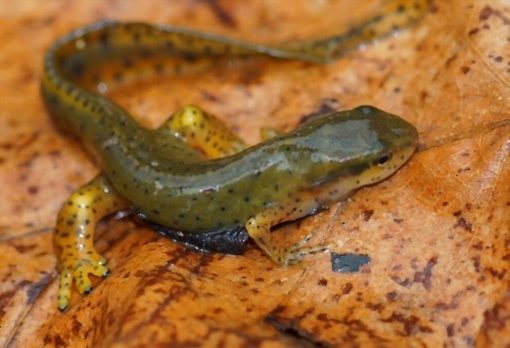Have you ever walked by a quiet pond in the early morning and noticed a tiny splash? That could have been a newt sliding under the water. Makes you wonder: do newts like being alone, or do they hang out with others?
Newts are mostly solitary, but it depends on the time of year and what they need. Newts usually spend most of their lives alone. They don’t roam in groups like many frogs. However, there are times when they come together, especially during breeding season.
How Newts Spend Their Days
Newts like to explore ponds, streams, and damp forests mostly by themselves.
Picture a small orange or brown newt slipping under a lily pad. It’s on its own, hunting tiny insects, worms, or other little water creatures.

Being alone helps it stay safe. If too many newts were in one spot, birds, fish, or other animals would spot them more easily.
Being alone gives it space to hunt and hide.
You might wonder how it knows where to go by itself. Newts have very sensitive senses for their size.
They can feel vibrations in the water and pick up smells around them. Even alone, a newt can find food and stay safe without a buddy nearby.
Do Newts Ever Look for Company?
Even though newts are mostly alone, they do meet others sometimes. Breeding season is when this happens.
In spring or early summer, male newts look for females to mate with.
When a male finds a female, he does a kind of dance. He waves his tail and releases scents to get her attention. It’s a pretty neat sight.
For a few days, newts put up with company and even show some social behavior.
After mating, though, they split up again. The male goes back to being alone, and the female finds a quiet spot to lay her eggs.
Other than these short moments, newts just like being alone.
Why Being Alone Works for Newts
There are a few reasons newts mostly stick to themselves:
-
Food: Newts eat tiny insects, larvae, and worms. Hunting alone means less competition.
-
Safety: A single newt is harder for predators to see than a group.
-
Energy: Moving quietly alone in water or damp soil takes less energy than trying to coordinate with others.
Imagine a newt crawling slowly along the muddy bottom of a pond. If other newts were crowded nearby, it would be stressful and risky.
Staying alone lets it move freely, hunt successfully, and hide from predators.
How Newts “Talk” Without Crowds
You might think solitary animals don’t communicate much, but newts have a way. They use chemicals in the water.

A newt releases tiny scents called pheromones that tell others where it has been or if it’s ready to mate.
It’s like sending a secret note that only another newt can read. Even though they live mostly alone, they can still “talk” when they need to.
Do Newts Have Territories?
Most newts do have a sort of personal space. They often go back to the same hiding spots, hunting areas, or ponds year after year.
Those spots basically become their territory. But they don’t fight for it.
A newt won’t get into a battle over a patch of mud. It just moves somewhere else if another newt shows up.
Being alone and having quiet boundaries works better than fighting.
Being Alone Helps Newts Survive
Being solitary isn’t just a choice, it helps newts survive. They hide under leaves, mud, or rocks, keeping away from predators.
Their slow, careful movements and ability to sense danger help them stay safe.
Even when a predator comes close, a newt can drop its tail to distract the attacker. Then, quietly, it slips away.
This trick works best when it’s alone.
A crowded pond could make it harder to escape without being seen.
When You Might See Newts Together
Sometimes newts might be in the same area for a bit:
-
Heavy rains: Temporary ponds fill, and multiple newts might share the same space to find food.
-
Breeding grounds: Males might chase each other briefly for mates.
-
Small habitats: In tiny or crowded ponds, newts might have to tolerate neighbors, but they still keep their distance.
Even then, they don’t form lasting groups. They just hang out until things change.
How They Compare to Other Amphibians
Not all amphibians like being alone. Frogs often gather in groups, especially during mating. Some salamanders sometimes move in small clusters if food is easy to find.

Newts, though, like quiet time by themselves. That makes them different.
They rely on careful movements, chemical messages, and personal space to live successfully.
Solitude Matters for Pet Newts
If you keep newts as pets, solitude still matters. They do better when there are only a few in a tank with enough space.
Crowding stresses them out, makes them eat less, and makes them hide more.
A small tank with hiding spots, shallow water, and damp land works best.
Even with a few newts in one tank, they still need room to be alone. Watch them, and you’ll see each one finds its favorite spot.
Conclusion
So, are newts solitary? Yes. For most of their lives, they like being alone. They hunt alone, hide alone, and move quietly through their watery worlds. Social interactions are short, usually just for breeding.
Even then, they go back to being alone quickly.
Being alone helps them survive. It reduces competition, keeps them safer from predators, and helps them save energy.
Knowing this, we can appreciate newts more and give them spaces that respect how they naturally live.
Hi, my name is Ezra Mushala, i have been interested animals all my life. I am the main author and editor here at snakeinformer.com.

